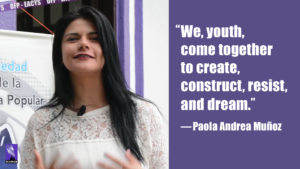Spirited Reflection: The vulnerability of children and communities

“We, youth, come together to create, construct, resist, and dream.” —Paola Andrea Muñoz
January 6 is the beginning of Epiphany and KAIROS spirited reflections are focusing on children, based on the new Epiphany Resource Listen to the Children: A Worship Resource for Justice Seekers (digital) (print) et Écoutez les enfants.
The Gospel reading of Matthew 2:1-12 tells the familiar story of eastern astrologers – or Magi – searching for the infant they believe to be the new king of the Jews. The Magi find baby Jesus in Bethlehem, but also arouse the fear and suspicion of King Herod who is paranoid about losing his power and control over to the people of Judea. Joseph, Mary and baby Jesus flee to Egypt to escape Herod’s wrath. In the remaining verses of the chapter, we learn that Herod orders all children of Bethlehem under two years to be slaughtered. He does this to ensure that the young king of the Jews is dead.
Matthew’s story draws from Hebrew Scripture and history. When Jesus and his family are finally able to return from Egypt to their home in Galilee, Matthew quotes Hosea 11:1, “Out of Egypt I have called my son” to compare Jesus to Moses and the exodus from Egypt. He likens Herod’s killing of infants in Bethlehem to the Pharaoh’s slaughter of Hebrew boys at the time of Moses. Additionally, he links Herod’s horrific act of infanticide with a prophecy in Jeremiah:
A voice was heard in Ramah, wailing and loud lamentation, Rachel weeping for her children; she refused to be consoled, because they are no more.
Rachel was the favoured wife of the patriarch Jacob and the mother of Joseph and Benjamin. In Israelite tradition, she would have been dead a thousand years before Jeremiah predicted the Babylonian conquest of Judah and its exile. Nevertheless, Jeremiah hears this “clan mother” weeping bitterly for harm inflicted upon her offspring over the generations. Tradition has it that Rachel was buried near Bethlehem, and perhaps for this reason, Matthew links the slaughter of Bethlehem’s innocent children to Rachel’s un-consolable lament in the book of Jeremiah.
Matthew’s narrative portrays the profound vulnerability of children. Jesus himself is vulnerable. He and his parents become refugees in order to avoid death, walking hundreds of kilometres through difficult terrain and, likely, harsh weather. But they at least find some security in Egypt, unlike the little ones in Bethlehem or the Hebrew boys of Moses’ time. These innocents are torn from their parents’ arms and callously murdered.
Children continue to be vulnerable in our world today. Despite advances in nutrition, health care, education and protection, children continue to suffer inordinately. Some 400 million live in abject poverty, with 160 million suffering from stunting and chronic malnutrition. In 2017, 6.3 million children and adolescents died from lack of access to medicine and clean water. Some 250 million live in war-affected countries, experiencing the trauma, insecurity, disruption, hunger and illness that war brings. Half of the world’s 65 million displaced people are children. Around the world, children are found in prisons and detention centres, refugee camps, sweat shops, brothels and on the streets.
Who – or what – are the Herods of today? What evil forces continue to harm children in horrific ways? Is it society’s addiction to fossil fuels, with the resultant climate change bequeathing future generations a terrifying existence? Is it irresponsible mining which pollutes water, disregards Indigenous land rights,
and tears apart the social fabric of communities? Is it the grinding poverty and economic oppression which force families to make the difficult – and sometimes dangerous – choice to migrate? Is it the wars and armed conflicts that traumatize the lives of children in so many ways?
Matthew’s story invites us to consider the vulnerability of children – in Jesus’ time and our own. It urges us to consider who are the Herods today. Perhaps it also urges us to do as Rachel did – lament and weep for the children.
Prayer
Holy God, we gather our prayers today giving thanks for the astrologers who were overjoyed when they met Jesus. Holy God we listen to you As we listen to the Children,
We pray for safe travel, and good conscience of those who watch over unaccompanied children seeking refuge and sanctuary. Holy God we listen to you As we listen to the Children,
For the mothers who weep with the anguish and despair of children lost and missing. For children who never made it home from Residential Schools, for children taken, trafficked and forced into modern day slavery, for children abducted and forced to fight in wars. Holy God, we listen to you As we listen to the Children.
We pray that the vulnerability of children is not taken advantage of, that all children searching for a place to belong, to be loved unconditionally, to be affirmed and nurtured find a place of sanctuary to be free, to be who they are in you. Amen
With thanks to the KAIROS Epiphany Team, including all the child consultants and Shannon Neufeldt, to Esther Epp-Tiessen for this reflection and to Su McLeod for the Prayer. Esther Epp-Tiessen is the former MCC Ottawa Office Public Engagement Coordinator for Mennonite Central Committee Canada (MCC) in peace and justice advocacy. When in Treaty 1 Territory and Homeland of the Metis Nation, she loves to walk, read and write and hunt for wildflowers in the spring.



